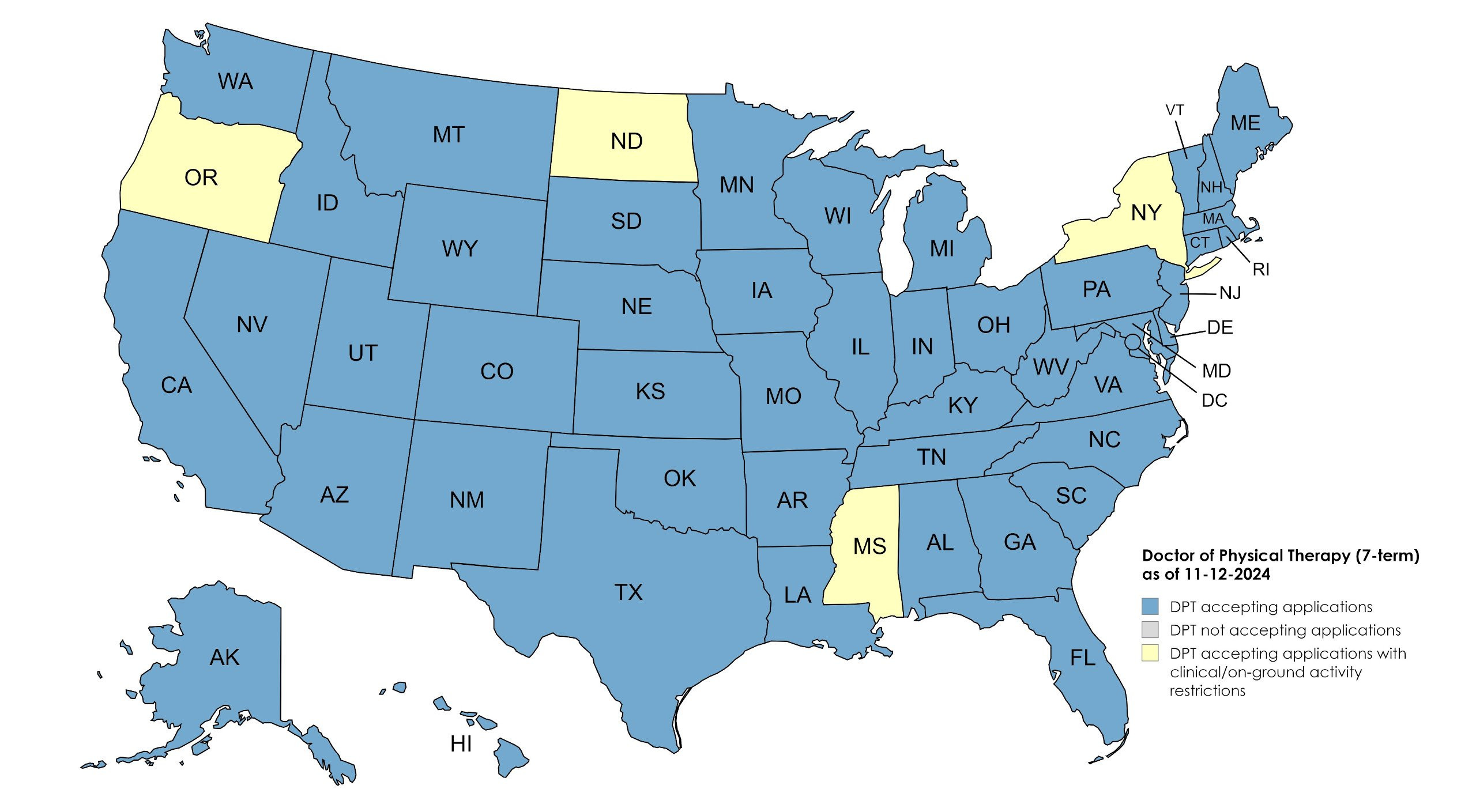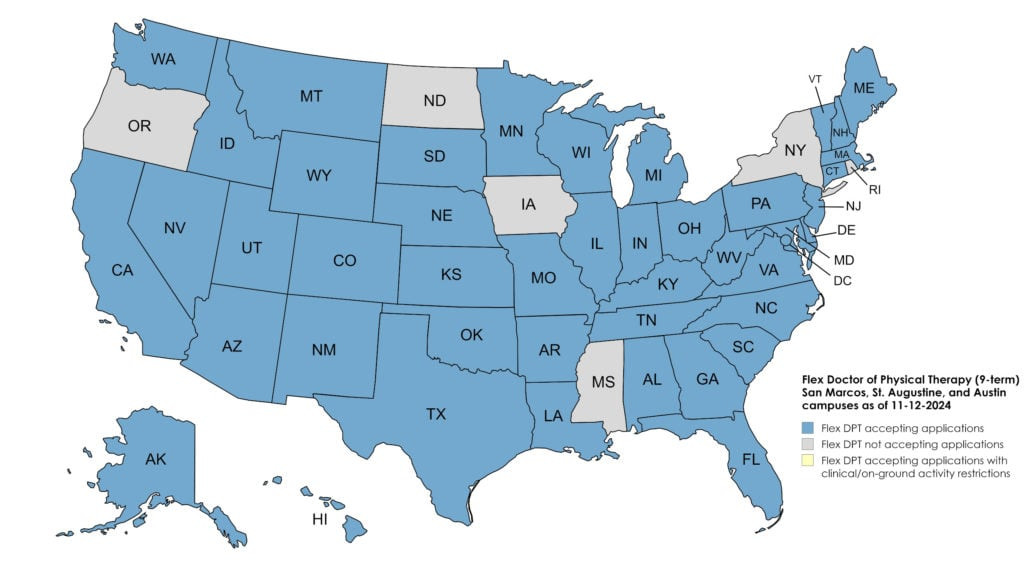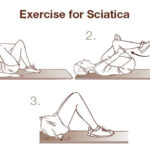Earning a Doctorate In Physical Therapy (DPT) is a significant step towards a rewarding career in helping people recover from injuries and improve their movement and quality of life. For prospective students considering this path, understanding program accreditation is crucial. Accreditation ensures that the program meets rigorous standards of quality in curriculum, faculty, and student resources, ultimately preparing graduates to be competent and ethical physical therapists.
The University of St. Augustine for Health Sciences (USAHS) is dedicated to providing high-quality DPT education. A key indicator of this commitment is the accreditation of their Doctor of Physical Therapy programs by the Commission on Accreditation in Physical Therapy Education (CAPTE). CAPTE is a nationally recognized accreditation agency that sets the standards for physical therapy education programs. This article will detail the accreditation status of USAHS’s DPT programs across its various campuses and program formats, providing essential information for anyone considering a doctorate in physical therapy.
Understanding DPT Program Accreditation and CAPTE
Accreditation by CAPTE is a voluntary, peer-review process that signifies a DPT program’s commitment to excellence. CAPTE accreditation assures students, the public, and the healthcare community that a program has met specific quality standards. These standards encompass various aspects of the program, including:
- Curriculum Content: Ensuring comprehensive and evidence-based education in physical therapy principles and practice.
- Faculty Qualifications: Verifying that faculty members are experts in their fields and dedicated to student learning.
- Student Resources: Assessing the availability of adequate facilities, equipment, and support services for students.
- Program Outcomes: Monitoring student achievement and program effectiveness in preparing graduates for successful careers.
Choosing a CAPTE-accredited doctorate in physical therapy program is vital for several reasons:
- Licensure Eligibility: Graduation from a CAPTE-accredited program is a prerequisite for taking the National Physical Therapy Examination (NPTE), which is required for licensure in all states.
- Professional Credibility: Accreditation enhances the credibility and reputation of the DPT degree, making graduates more competitive in the job market.
- Quality Education: Accreditation assures students that they are receiving a high-quality education that meets professional standards.
USAHS Doctorate in Physical Therapy Programs – Accreditation Status Across Campuses
USAHS offers various formats for its doctorate in physical therapy programs, including residential, flex, and hybrid immersion models, across multiple campuses. Each campus’s DPT program accreditation status is individually reviewed and granted by CAPTE. Below is a breakdown of the accreditation status for each USAHS campus:
Doctor of Physical Therapy – San Marcos Campus Accreditation
The Doctor of Physical Therapy and Doctor of Physical Therapy Flex programs at the San Marcos, California, campus of the University of St. Augustine for Health Sciences are fully accredited by CAPTE.
For specific inquiries or to verify accreditation, you can contact CAPTE directly:
Commission on Accreditation in Physical Therapy Education (CAPTE)
3030 Potomac Ave., Suite 100,
Alexandria, Virginia 22305-3085
Telephone: 703-706-3245
Email: [email protected]
Website: http://www.capteonline.org
It’s important to note that while the DPT and DPT Flex programs are accredited, other programs such as the Transitional Doctor of Physical Therapy, Clinical Orthopaedic Residency, and Orthopaedic Manual Physical Therapy Fellowship programs are not subject to CAPTE accreditation.
For program-specific inquiries at the San Marcos campus, contact Dr. Jim Mathews at 760-410-5316 or via email at [email protected]
Graduates of the accredited DPT programs are eligible to sit for the national licensing examination administered by the Federation of State Boards of Physical Therapy (FSBPT). Successful completion of this exam and meeting state licensure requirements are necessary to practice as a Physical Therapist (PT). Note that a felony conviction may impact eligibility for the FSBPT exam and state licensure.
Doctor of Physical Therapy – St. Augustine Campus Accreditation
Similarly, the Doctor of Physical Therapy and Doctor of Physical Therapy Flex programs at the St. Augustine, Florida campus of USAHS hold full accreditation from CAPTE.
For direct program inquiries at the St. Augustine campus, contact Dr. Beth Ennis at 904-770-3645 or email [email protected]
Accreditation details and CAPTE contact information remain the same as listed for the San Marcos campus. Graduates of these accredited programs are also eligible for the NPTE examination and subsequent licensure as Physical Therapists, with the same considerations regarding felony convictions.
Doctor of Physical Therapy – Miami Campus Accreditation
The Doctor of Physical Therapy program at the Miami, Florida, campus is also accredited by CAPTE. This accreditation applies to the DPT program offered at this location.
For program-specific information at the Miami campus, contact Dr. Beth Ennis at 904-770-3645 or [email protected]
CAPTE contact details and licensure eligibility information are consistent with the other campuses.
Doctor of Physical Therapy – Austin Campus Accreditation
The Doctor of Physical Therapy and Doctor of Physical Therapy Flex programs at the Austin, Texas campus are accredited by CAPTE, ensuring quality education for students in these programs.
For inquiries related to the DPT programs at the Austin campus, contact Dr. Chris Wise at 737-202-3347 or [email protected]
Accreditation and licensure details remain aligned with the other USAHS campuses.
Doctor of Physical Therapy – Dallas Campus Accreditation
The Doctor of Physical Therapy program at the Dallas, Texas campus of USAHS is also fully accredited by CAPTE.
For program information at the Dallas campus, please contact Dr. Thomas P. Werner at 469-498-5740 or [email protected]
As with all other accredited USAHS DPT programs, graduates from the Dallas campus program are eligible to take the NPTE and pursue licensure.
A diverse group of students collaborating in a Doctor of Physical Therapy program setting, showcasing the hands-on learning environment.
State Approvals and Important Licensure Information for DPT Graduates
Beyond CAPTE accreditation, it’s also essential to understand state approvals and licensure requirements. USAHS DPT programs are designed to meet the educational requirements for licensure in all 50 states. However, state authorization for on-the-ground educational activities varies.
Post-Graduation Licensure:
The USAHS DPT program curricula are designed to satisfy the educational requirements for licensure in all 50 US states. It’s important to note that some states have restrictions regarding USAHS’s authorization to conduct on-the-ground educational activities. These restrictions primarily affect enrollment eligibility for students residing in those states for residential DPT programs but should not hinder graduates’ licensure eligibility, provided all other state requirements are met.
USAHS has not yet determined if its curriculum meets educational requirements for licensure or certification in US territories such as American Samoa, Puerto Rico, Guam, and others.
State-Specific Approvals:
USAHS is currently accepting applications for its Doctor of Physical Therapy (7-term curriculum) from residents of a wide range of states. For the most up-to-date list of states and specific program availability (Residential DPT, Hybrid Immersion DPT, Flex DPT), please refer to the USAHS website or contact an enrollment advisor.
Hybrid Immersion DPT Program (HI DPT – San Marcos and Miami Campuses, Starting Spring 2025):
The Hybrid Immersion DPT program is designed to meet licensure requirements across all 50 states. While some states may have restrictions on on-the-ground activities, these should not impact licensure eligibility. Applications are currently being accepted from residents of numerous states for the HI DPT program.
 USAHS Residential DPT State Approvals-11-12-2024
USAHS Residential DPT State Approvals-11-12-2024
Flex DPT Program (San Marcos, St. Augustine, and Austin Campuses, Starting Fall 2024):
The Flex DPT program also satisfies licensure requirements in all 50 states. Similar to other programs, state restrictions on on-the-ground activities may exist but are not expected to affect licensure. Applications are open to residents of many states for the Flex DPT program.
 USAHS Flex DPT State Approvals-8-7-24
USAHS Flex DPT State Approvals-8-7-24
Curriculum for Students Starting Summer 2024 and Before:
For students who began their DPT studies before Fall 2024, the curriculum also meets licensure requirements in all 50 states. State restrictions on on-the-ground activities are similar to the current programs.
Responsibility of the Student:
It is crucial for prospective and current students to understand and comply with all requirements related to clinical education experiences, licensure, certification, and state authorization in their state of residence. Students are encouraged to verify the most current state approval information and licensure requirements directly with USAHS and their state licensing board.
Filing a Complaint with CAPTE
Individuals wishing to file a complaint regarding a CAPTE-accredited physical therapy program can find the process and necessary information at the CAPTE website: http://www.capteonline.org/Complaints/
Contact Information for Further Accreditation Details
For additional information about DPT program accreditation, please contact CAPTE directly:
Commission on Accreditation in Physical Therapy Education (CAPTE)
American Physical Therapy Association
3030 Potomac Ave., Suite 100
Alexandria, VA 22305-3085
Telephone: 703-706-3245
Email: [email protected]
Website: www.capteonline.org
Choosing an accredited doctorate in physical therapy program like those offered at the University of St. Augustine for Health Sciences is a vital investment in your future career as a physical therapist. Accreditation ensures program quality and facilitates your path to professional licensure and success in the field.

